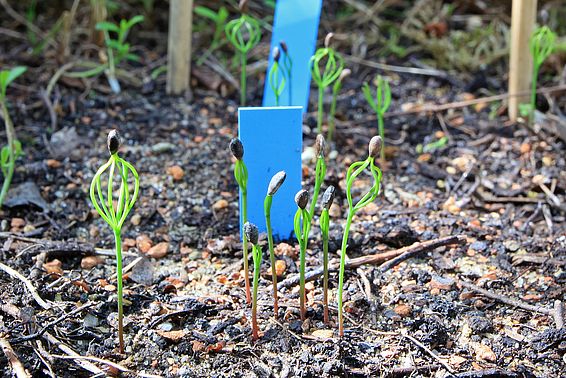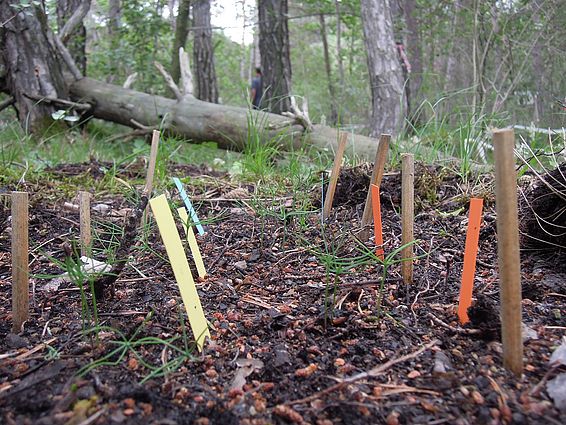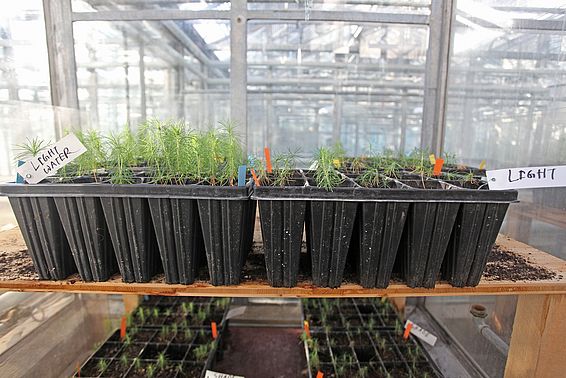20.02.2020 | Beate Kittl | News WSL
During their lifetime, trees are not only able to adapt quickly to new conditions but can even pass on the 'memory' of such environmental changes to the next generation. This amazing ability has been proved for the first time by researchers at the Swiss Federal Institute for Forest, Snow and Landscape Research (WSL). The findings provide hope that trees will be better at adapting to climate change than was originally feared.

Current global warming is happening too quickly for long-lived organisms such as trees to be able to adapt genetically to new living conditions through the process of evolution, which takes many generations. Fortunately, trees – like all plants – can respond very flexibly to their environment, for example by forming more roots in times of drought and more leaves (promoting strong growth) when conditions are good. However, these specific environmental adaptations are not handed down genetically to their offspring; the inherited genome only includes the ability for a tree to adapt itself.
Consequently, it was long believed that the abilities acquired by an individual tree were lost from one generation to the next. It is only in recent years that scientists have discovered mechanisms in animals and humans that allow them to pass on responses to environmental influences to their offspring. These mechanisms take the form of small molecules, known as methyl groups, which are attached to DNA building blocks and help determine the extent to which individual genes are deployed. This pattern of molecular groups is transmitted to offspring via egg cells, sperm or pollen.


Non-genetic transmission
For the first time, WSL researchers have now identified the same ability in forest trees. Their findings are based on observed effects rather than direct molecular research. The research team made use of a long-term irrigation experiment run by the WSL. In 2003, WSL scientists began irrigating specific forest plots at Pfynwald in Valais, where Scots pines grow in extremely dry conditions. On some plots, the irrigation was stopped after 10 years. This long-term experiment provides perfect conditions for studying how trees adapt to dry and damp conditions. The team, led by postdoctoral researcher Arun Bose, collected cones from mother trees and extracted the seeds.
Some of the seeds were then sown in a greenhouse under different water, light and temperature conditions, others in irrigated and non-irrigated plots at Pfynwald. The results in the greenhouse were clear: the offspring of parent trees that were used to drought coped much better in low-water conditions because they formed more root mass, whereas among the well-watered seedlings the offspring of parents from irrigated areas performed better because they produced more needles. The seedlings whose parents had stopped being irrigated in 2013 had growth values between the two.
"This is the first proof that parent trees pass on environmental information to their offspring, thereby helping them to cope better with the conditions in which they live," says ecologist Arthur Gessler, head of the WSL's Ecosystem Ecology Research Group, who led the study. "Right from the start, offspring are prepared for the situations they can expect to encounter." The researchers were able to rule out other potential advantages such as some seeds having bigger energy reserves: all the seeds were the same weight.
Training for the genome
Gessler explains the process of DNA methylation as "a kind of training for the genome". The genetic potential is the same in all individuals, but thanks to methylation, the genome 'knows' which genes boost the chances of survival and should therefore be fully deployed from the start of the growing process. Researchers at other institutions are currently investigating whether it is indeed this molecular mechanism that is at work in trees.
However, trees' acclimatisation potential does have its limits, as demonstrated by the extremely hot and dry summer of 2018 when the field trials were carried out at Pfynwald. Many of the seedlings died, regardless of which parent tree they came from. "The pines at Pfynwald are living at the dry limit of their range," explains Gessler. So if the climate becomes even hotter and drier in the future, even the sophisticated tactic of methylation will be unable to prevent the long-term decline of Scots pines in Valais.
Contact ¶
Links ¶
Original publication: Plant, Cell & Environment
- WSL group Ecosystem Ecology
Copyright ¶
WSL und SLF stellen Bildmaterial zur Bebilderung von Presseartikeln im Zusammenhang mit dieser Medienmitteilung kostenfrei zur Verfügung. Eine Übernahme der Bilder in Bilddatenbanken und ein Verkauf der Bilder durch Dritte sind nicht gestattet.
